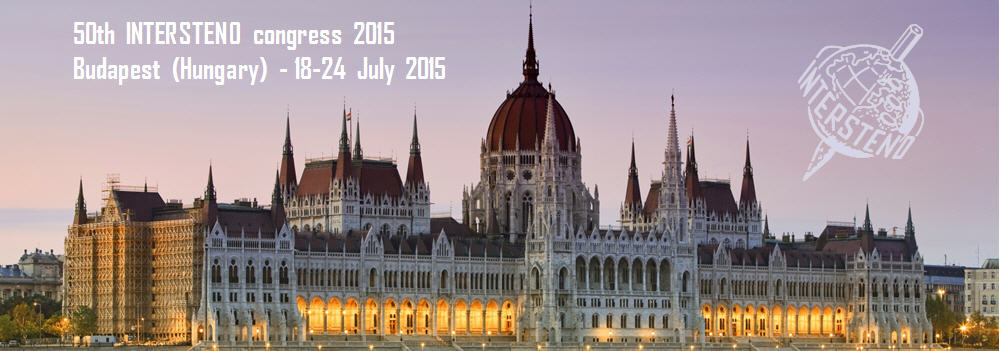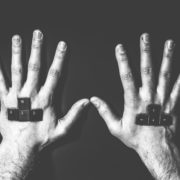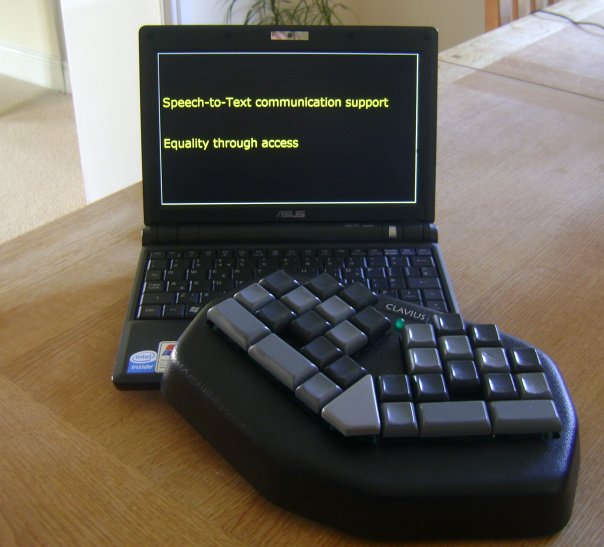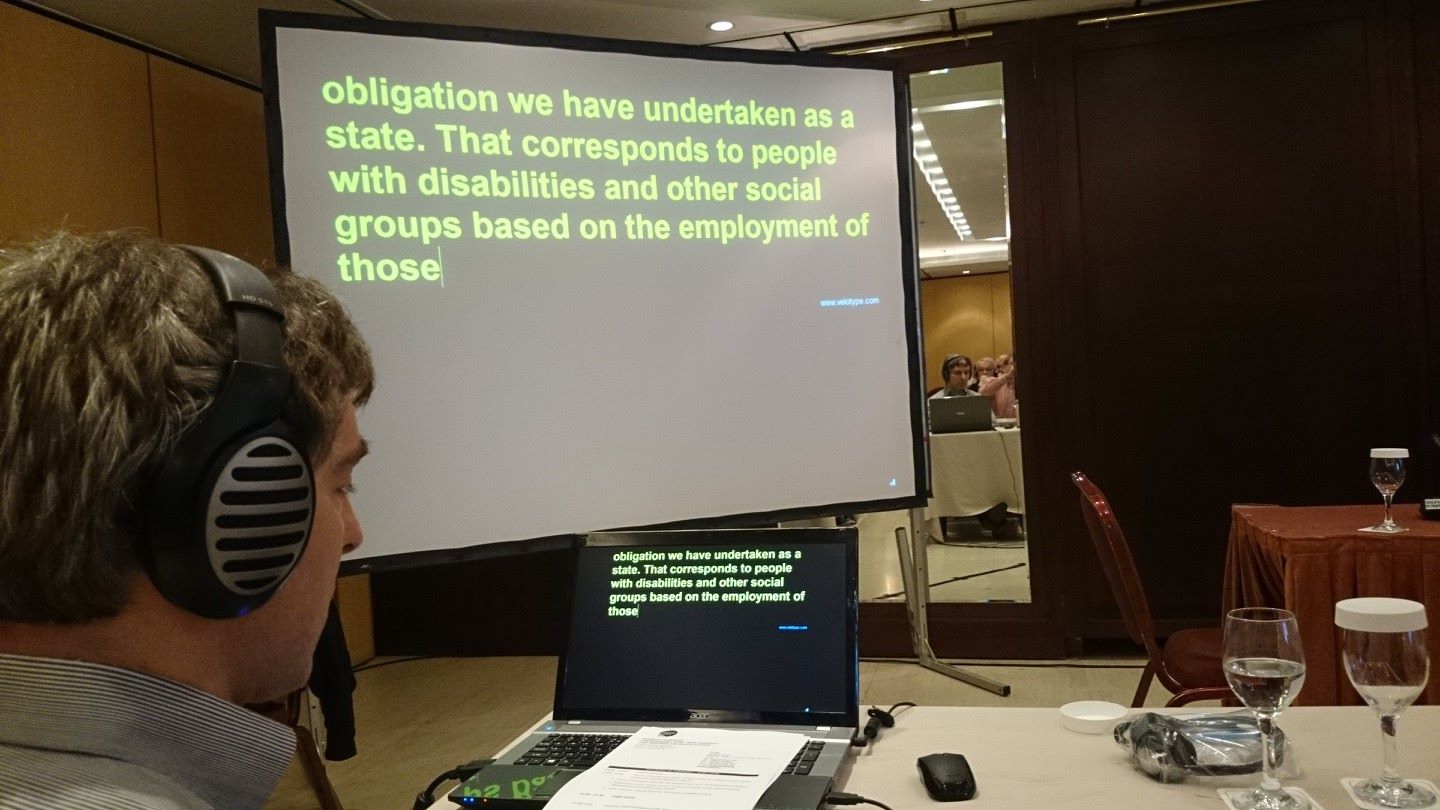Intersteno: The world championships
INTERSTENO: International Federation for Information and Communication Processing
Among the 530 participants (and about 500 really on spot), 268 registered for one to seven competitions, 75 of them took part in at least 3 contests or more … so about 695 tests had to be evaluated!
Immediately after the opening ceremony in the wonderful aula of Corvinus University, an efficient logistics team managed to accommodate, within less than 2 hours, the 550-seat aula into a competition room fully equipped for 120 candidates. Sunday from 7 in the morning, competitions were run ning: text production, text correction and audio transcription in the aula; note taking and summary on the 2nd floor in classrooms divided according to the languages. The word processing contest had been planned on Saturday afternoon, just after the opening ceremony. Speech capturing contests took place on Monday morning.
Text production
The TP contest still counts the greatest number of participants (205); it happened in two shifts. Germany still provides the biggest number of congress participants and competitors but we note an increased participation of Belgium (39), Italy (37) and United States (21), and for the first time, Japanese competitors were competing in English in several contests. Most of competitors (90 %) are using a standard keyboard. The average success rate is 66 % but more than 75 % of the pupils and juniors competitors are classified, while seniors – the more crowed category – have more difficulties in reaching the high standards requested for the world championship. Success is even more difficult for competitors using a chord keyboard or speech recognition technology; the main reason being the draconian requirements concerning the maximum number of faults allowed (0,25%).
Nevertheless, Wim Gerbecks (The Netherlands), the 2015 world champion in the senior category, used a chord keyboard: the Velotype. He reached the highest score of 758,9 characters per minute, with a high accuracy (0,097 % of mistakes). The best result with standard keyboard in senior category is held by Celal Aşkın (Turkey) with 695,9 cpm and 0,029 % while Karolina Foukalová (Czech Republic) gets the 1st place in the junior category (642,3 cpm – 0,119) and Zehra Taşkale (Turkey) in pupils one (567,2 – 0,029). Fine results … but the world record of the TP-leader, Helena Zaviačičová has not yet been overtaken.
Text correction
More than 120 participants competed in TC-contest which was coordinated by Waltraut Dierks. The amazing result of the Czech senior champion Petr Hais (220 corrections in 10 minutes) can only be explained by the use of well mastered keyboard shortcuts: a technique that only a regular training can ensure. We offer as well our congratulations to the junior champion, Karolína Foukalová (160 corrections) and the pupils one, Martina Ivanova (170 corrections), both of the Czech Republic. Helped by a very efficient duo (Zendka Kundrátková and Robert Sigmund), Helena Zaviačičová managed the automatic evaluation of the text production works as well as of text correction and audio transcription ones.
Professional word processing
Seven countries have registered 63 competitors for this particular contest. The success rate is very low: 41 %, the laureates coming from 4 countries: Belgium, Czech Republic, Germany and Slovak Republic. Competitors who succeed are real professionals.
Sunday in the early morning, a 4-corrector team has managed this difficult evaluation while the leader (Georgette Sante) was busy with other duties. Many thanks to Regina Hoffman, Uwe Brüdigam, Olivier Levrau, Pieterjan Oste. Petr Hais (Czech Rep.) is the world champion in the senior category with 98 %. Congratulations are due to the junior competitor Patrik Žori, 1st place in his category, the sole successful Slovak competitor and to the very young Martina Ivanova (Czech Rep.) the unique pupil classification.
Audio transcription
This new world championship reflects the current trend in a lot of parliaments: the sessions are recorded and editors encode what they listen to. A good knowledge of the language and concepts of general culture are necessary to succeed; and excellent spelling as well. A lot of voice writers from Italy have competed with success.
The senior world champion is Gioia Pedretti (Italy); the laureate at the second place (Mirella La Rosa), the third one (Petr Hais), the junior world champion (Karolína Foukalová- Czech Rep.) reached more than 6000 points; the pupils world champion is Klára Odehnalová (Czech Rep.) with 4939 points. Francesca Marchionne, leader of the contest, managed translations and audio recordings in the best way possible so that all competitors can compete under similar conditions. The audio transcription contest was the last contest on this heavy Sunday.
Note taking and summary reporting
In order to avoid too much heat and sun in the aula, the NT contest took place just after the text correction and before the audio transcription. It happened on the 2nd floor, in classrooms with airco. A sufficiently long break permitted the candidates competing in all contests to have lunch. NT evaluates another competence often requested in parliaments and meetings: to able to take notes and make a concise report of a conference, a meeting, a debate. Helped principally by Uda Kuhn, Jan den Holder is the coordinator of this difficult contest, for which jury members have to appreciate, case by case, the exactitude of the summary. The 3 international champions come from Czech Republic: Lukáš Beránek (senior), Anna Mičková (junior) and Martina Ivanova (pupil).
Speech capturing
Almost half of the competitors use handwritten shorthand, principally German and Hungarian ones. Some competitors (Czech Republic, among others) prefer to take notes directly with the computer keyboard and word-processing software in which they have introduced shortcuts. France, Korea, USA prefer using a chord keyboard (Stenotype, Velotype, …) while a new technique is now more and more used: voice writing (the reporter dictates the text – with the help of a stenomask – to a speech recognition software which produces a transcription immediately.
The fastidious work made by the leader Jari Niittuinperä before the congress, despite his huge “normal job” is rewarded by the success of competitors: Laura Brewer (USA), 1st place in SC with chord keyboard (A15), senior, Zsuzsa Ferenc (Hungary), 1st place in graphic shorthand (A14), senior, Tori Pittman (USA), 1st place in SC in voice writing (A14), senior, Rongxin Ji (China), 1st place in SC with chord keyboard (B8), junior, Karolína Foukalová (Czech Rep.), 1st place in SC with standard keyboard (C7), junior, Alessandro Fuligni (Italy), 1st place in SC with standard keyboard (C6), senior, Klára Odehnalová (Czech Rep.), 1st place in SC with standard keyboard (C6), pupils, Erika Pekár (Hungary), 1st place in graphic shorthand (C3), junior.
Real time speech capturing
The top competence for reporters: to be able to render the transcription just at the end of the conference. A difficult exercise! Congratulations to all the competitors, successful or not, mainly to the first one in each category: John Wissenbach (USA), senior, chord keyboard; Rongxin Ji (China), junior, chord keyboard; Klára Odehnalová (Czech Rep.), pupil, standard keyboard. And thanks to Teri Gaudet which managed the competition with the help of Linda Drake and other US friends.
Source: INTERSTENO International Federation for Information and Communication Processing









Leave a Reply
Want to join the discussion?Feel free to contribute!